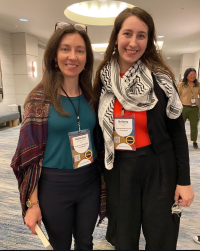My name is Brittany Shaheen (she/her/hers), and I have served at the Center for Arab American Philanthropy (CAAP) since February of 2021, beginning as a Program Generalist and working my way to my current position as a Program Officer. CAAP, a national institution of ACCESS and the only Arab American Community Foundation in the country, empowers the Arab American community by strengthening strategic giving in the community while shaping perceptions, highlighting heritage, and demonstrating collective impact.
What I enjoy most about my role is working on granting unrestricted funds to our Arab American organizations across the country, ranging from human service work to arts and culture. Since unrestricted funds provide the most flexibility, they can also provide the greatest number of opportunities. Our work ranges from increasing the capacity of the organization to starting a new program that could benefit the community to advocacy work and or much more. My goal is to work toward either finding more funds for our unrestricted grantmaking or expanding our grantmaking beyond a single yearly grantmaking cycle.
When I heard about the GCIR 2024 conference, I immediately knew I wanted to attend. I was honored to be the recipient of the Emerging Leader Scholarship, and I learned so much as a result. I was especially appreciative that the conference was willing to address some topics head-on and not mince words, particularly on the ongoing genocide in Gaza and attacks on Lebanon. It is often called a conflict in both the media and larger nonprofit circles, which goes against many of the common goals most organizations prioritizing immigrant and refugee justice claim to have. The Arab American community has been deeply affected in the last year by constant concern and grief for friends and family overseas, and have been facing rampant racism and Islamophobia. The fact that the conference took a strong stance right at the beginning made me even more excited for the next three days.
One of the biggest things I would most like to take back to my organization, particularly with leadership and the board, is how to push them to be bolder and more progressive, even if it takes longer to get actual results. While boards and leadership may look for a more measurable approach and to see clear results, funding true impact rather than fulfilling a grant cycle will create more long-term and sustainable change. For example, at the "Challenging the 'National Security' Frame in Immigration Policy" session, I learned it can take years to collect data and understand immigration discrimination. Not only is each group and situation unique, but it can take even longer to address and fight the issues once you have that information.
In the session “Resourcing Global Movements for Transformative Change,” I learned about transnational nonprofits, nongovernmental organizations that operate across borders and are not controlled by the state. My organization regularly makes grants that leave the country, including to several organizations that I now know are transnational nonprofits, so the session was very informative. It helped me understand a lot more about building relationships with bigger networks worldwide. In the past, when I would research possible grantee organizations in a new area, my options would be limited since we can only grant to other 501c3 organizations. Now, I have new methods and ideas for finding an intermediary organization, which could help me form relationships with, or directly make grants to, a grassroots organization that would make the most impact.
At the conference, I spoke to other attendees who were very interested in learning about my organization, as well as our larger network of Arab American organizations across the country. I also had several interesting conversations with people about changes they have seen in the last several years, as well as changes they would like to see in their own organizations. One conversation I had revolved around decentering donors from our work. While donors help keep things running, there can be several downsides to making them a main concern in our organizational decision-making, a concept that is comparable to centering whiteness in philanthropy. By focusing on what the donors want, we may be missing actual needs of communities and fueling further systemic injustices.
I think it’s important to recognize that the GCIR conference immediately preceded the election. Something that resonated through all the speakers, breakout sessions, and general discussions amongst attendees was that the results of the election matter less than what we do going forward.
Everyone working in this movement understands that it’s for the long haul. Mobilizing for change doesn’t just last years, it lasts decades, and often longer than lifetimes. Something that I did take away from this conference was the feeling that, no matter how hopeless things can feel, there will always be people who will step up. Being in a big group of like-minded people, you feel a sense of camaraderie and hope, knowing that all these people also want to work toward change. Someone at the conference said how refreshing it was to be around people that are on the same page, and that sometimes it feels like there’s a fire next door, and no one seems to care. I’ve felt like that at some point with family and friends, particularly in the last year, and it can be isolating. Being outside of your bubble doesn't just give you a fresh perspective, it can also breathe some new life into you when you're feeling like nothing will change.
Attending the GCIR conference did just that for me by reinforcing my commitment to the work we all have to do together going forward.

